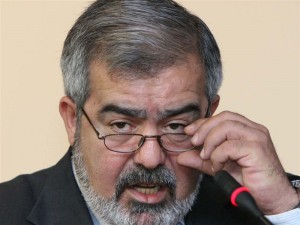A top leader of the Armenian Revolutionary Federation-Dashnaktsutyun expressed on Sunday concern about the possibility of a shock alliance between President Serzh Sarkisian and his hitherto main nemesis, Levon Ter-Petrosian.
Speaking at a Dashnaktsutyun rally held in Paris, Hrant Margaryan, chairman of the party’s ruling Bureau, said he hopes Sargsyan will not accept what he called a cooperation offer extended by Ter-Petrosian last week.
“I don’t know whether Levon Ter-Petrosian has already reached an agreement with Serzh Sargsyan behind the scenes or whether his public statement is a manifestation of such an agreement,” he said in a speech the transcript of which was circulated by the Bureau. “Perhaps this is the latest Ter-Petrosian adventure.”
“I don’t want to believe that Serzh Sargsyan can finally abandon the national course which was adopted with his participation in 1998 …, finally turn his back on his teammates and surrender to [Ter-Petrosian’s] HHSh. It’s hard to imagine that but everything lies ahead. Time will tell,” added Margaryan.
The Dashnaktsutyun leader referred to Ter-Petrosian’s speech last Wednesday in which the leader of the opposition Armenian National Congress (HAK) signaled his readiness to recognize Sargsyan’s legitimacy under certain circumstances. Ter-Petrosian also denounced the main arguments of Dashnaktsutyun and other “extreme nationalists” critical of the recently signed Turkish-Armenian agreements.
Margaryan construed this as another indication that Ter-Petrosian supports Sargsyan’s controversial policy of rapprochement with Ankara despite HAK leaders’ criticism of the agreements. He claimed that the HAK suspended its anti-government rallies and refused to join a Dashnaktsutyun-led opposition coalition in order to “salvage the protocols even at the cost of keeping Serzh Sargsyan in power.”
Margaryan claimed at the same time that Ter-Petrosian is offering the president to “surrender” to the HAK and thus “defend against Dashnaktsutyun and other national forces.”
In his speech, Ter-Petrosian gave a mixed assessment of the two protocols. He again condemned one of their most controversial provisions envisaging the formation of a Turkish-Armenian panel of historians tasked with looking into the 1915 massacres of Armenians in the Ottoman Empire. But he defended another clause that commits Armenia to explicitly recognizing its existing border with Turkey.
Ter-Petrosian also stressed that Sargsyan could and should seek to legitimize his rule at home, rather than abroad. He said that could be done through solving “internal political problems” and creating “national solidarity.” Sargsyan has not responded to the extraordinary overtures yet.








